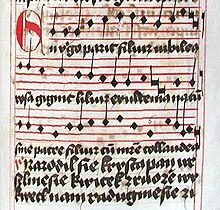Rejoice, earth and starry tent

Rejoice, Erd und Sternenzelt is a German-language Christmas carol . Text and melody are based on the Czech Narodil se Kristus pán .
Origin and reception
The song was written, probably in the 15th century, as a Czech translation of the Latin En Virgo parit filium :
|
En virgo parit filium, |
See, the virgin gives birth to a son, |
|
Narodil se Kristus Pán, |
Christ the Lord was born, |
The song is still the most famous Czech Christmas carol. The four-stanza German Kehrvers- Lied Freu dich, Erd und Sternenzelt , which was copied from him , first appeared in 1844 in Katholische Gesänge for public and domestic devotion, initially for the use of the faithful of the episcopal Leitmeritz diocese . From there it found distribution in Catholic and Protestant areas of the German-speaking area and was included in various hymn books, u. a. in Diocesan Appendices of Praise to God (1975) . The Evangelical pastor from the Palatinate, Johannes Pröger (1917–1992), wrote two new stanzas in 1950 instead of the Leitmeritz stanzas 3 and 4, which reproduce the angels' message to the shepherds of Bethlehem. The song was included in the Evangelical Hymnbook (No. 47), in the list of ö songs and in various diocesan parts of the Praise of God (2013).
melody
The simple and cheerful melody has been changed again and again in its long history. In the oldest recording it appears every three times. The most noticeable difference between the versions sung in the Czech Republic and Germany today is, in addition to the tempo - solemn and solemn in the Czech Republic, eighth notation in German hymn books - the two-fold heightening of the b (in F major) to the leading note h in the Czech version.
literature
- Ulrich Parent (T.), Martin Rößler (M.): 47 - Rejoice, earth and star tent . In: Gerhard Hahn , Jürgen Henkys (Hrsg.): Liederkunde zum Evangelisches Gesangbuch . No. 1 . Vandenhoeck & Ruprecht, Göttingen 2000, ISBN 3-525-50319-9 , pp. 69–71 ( limited preview in Google Book Search).
Web links
- Narodil se Kristus pán , German-language contribution from Radio Praha
- Josef Lauschman: Narodil se Kristus Pán . In: Cyril 1935, pp. 100-103 (Czech)
Individual evidence
- ↑ cantica.kh.cz
- ^ Radio Praha
- ↑ Hildesheim No. 813
- ↑ Udo Grub: Evangelical traces in the Catholic standard hymn book "Gotteslob" from 1975 (= Aesthetics - Theology - Liturgy. Volume 55). LIT Verlag, Münster 2012, ISBN 978-3-643-11663-5 , p. 235 ( limited preview in Google book search).
- ↑ Church Province of Hamburg No. 741
- ↑ Modern attempt at reconstruction
- ↑
